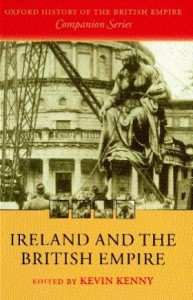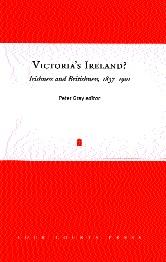Ireland and the British Empire
Published in 18th–19th - Century History, 20th-century / Contemporary History, Book Reviews, Early Modern History (1500–1700), Issue 3 (Autumn 2004), Reviews, Volume 12Ireland and the British Empire
Oxford History of the British Empire Companion Series
Kevin Kenny (ed.)
Oxford University Press, £30
ISBN 0199251835
Victoria’s Ireland
Peter Gray (ed.)
Four Courts Press, £55
ISBN 185 1 827587
 Irish participation in empire is most commonly considered a paradox: another unnatural by-product of the malign influence of British rule. Post-colonial studies, for all their intellectual elaboration, have, for the most part, perpetuated that view. In contrast, this new volume of the companion series of the celebrated Oxford History of the British Empire series illustrates the ambiguities and complexities of that relationship. In these essays the authors consciously challenge those old verities. The foreword states its ambition: a more comprehensive survey of the meaning and significance of ‘British Imperialism’, to both ‘rulers and the ruled’, as a ‘theme in world history’, though one can imagine that such definitions would themselves be considered loaded with misleading presumptions by many of the contributors. Such perceptions as ‘coloniser’ versus ‘colonised’—the one seen as proactive and negative in its practices, the other as reactive and positive in its responses, while conveniently abating the complexities for anti-imperial ideologies—have obscured our recognition that there was no convenient mutually exclusive place for such terms within the relationships between ‘ruler and ruled’ in empire. That is nowhere more true than with regard to what may have been both the crucible of colonial concepts and one of its richest sources of colonisers: Ireland.
Irish participation in empire is most commonly considered a paradox: another unnatural by-product of the malign influence of British rule. Post-colonial studies, for all their intellectual elaboration, have, for the most part, perpetuated that view. In contrast, this new volume of the companion series of the celebrated Oxford History of the British Empire series illustrates the ambiguities and complexities of that relationship. In these essays the authors consciously challenge those old verities. The foreword states its ambition: a more comprehensive survey of the meaning and significance of ‘British Imperialism’, to both ‘rulers and the ruled’, as a ‘theme in world history’, though one can imagine that such definitions would themselves be considered loaded with misleading presumptions by many of the contributors. Such perceptions as ‘coloniser’ versus ‘colonised’—the one seen as proactive and negative in its practices, the other as reactive and positive in its responses, while conveniently abating the complexities for anti-imperial ideologies—have obscured our recognition that there was no convenient mutually exclusive place for such terms within the relationships between ‘ruler and ruled’ in empire. That is nowhere more true than with regard to what may have been both the crucible of colonial concepts and one of its richest sources of colonisers: Ireland.
Almost all of the essays in both collections reviewed here improve our understanding of the periods studied without promoting the ideological or anachronistic moral preferences they self-consciously seek to challenge. Nicholas Canny in the preface to Kenny’s collection necessarily draws attention to the problems posed by such practice, emphasising that ‘if people are to be judged by moral standards, it must be by those they themselves cherished rather than those of the present generation’. He makes a slight criticism of the book himself, ‘suggesting’ that although the contributors show the complexity of relationships between Ireland and the British empire, the issue of the colonised Irish becoming active colonisers remains too often a moral one for many—‘principally scholars from other disciplines’.
Canny, beginning with the Early Modern period and progressing through to the twentieth century, evokes the chronological order of essays throughout the book. He ends with two accounts of the experiences of his own grandparents as proudly Irish participants in empire. Using evidence, anecdote and allusion to decorate an enjoyable narrative that still remains empirical rather than emotional, he sets the tone for the high quality of most of the essays that follow. Where is the paradox in Ireland being both ‘imperial’ and ‘colonial’, asks the editor Kevin Kenny in his introduction. There is ‘nothing anomalous’ in a ‘colonised people helping govern their homeland’ or in ‘conquering and governing others in the same empire’, a major part of which was Ireland’s contribution to ‘spiritual empire’, which, as he shows, was largely a ‘Catholic rather than a Protestant undertaking’. Jane Olmeyer argues that late sixteenth-century Ireland does not lend itself so conveniently as a laboratory for empire as some scholars have proposed. Many ‘Irish Catholics proved reactive and responsive to imperial schemes’, and although sections of the Irish were perceived as barbaric and uncivil that view was by no means the monopoly of the imperialist: ‘Where Catholic and Protestant writers disagreed was how a civilising agenda might be best implemented’. Gaelic and Catholic aristocrats such as the earls of Antrim encouraged the plantation of English and Scottish settlers on their lands in their eagerness to become ‘improving’ landlords. Those ambitions were transferred abroad as early as the mid-seventeenth century; for example, in Montserrat the majority of colonisers were Irish Catholics, and according to a citation from Donald Harman Akenson’s study of that island’s colonial history ‘they well knew how to be hard and efficient slave masters’.
 Thomas Bartlett’s study of the eighteenth century describes Ireland as a rather ‘unruly palimpsest’, an ‘untidy jumble’ of ‘kingdom’, ‘colony’, ‘dependency’ and, faintly, ‘nation’. Pitt’s ambition, albeit largely due to his fear of the French and nascent Protestant cultural nationalism, was to unite what he called Ireland, ‘that mighty limb of empire’, in a new ‘general imperial legislature’, which, free from ‘terror and resentment’ and ‘un-inflamed by the prejudices and passions of that distracted country’, would adjudicate impartially on those ‘vicious issues that have riven Ireland for years’. While Pitt may have been no less an ‘imperialist’ for all that, neither was Wolfe Tone: for him ‘Ireland’s inability to acquire an overseas dominions was an argument in favour of separatism’.
Thomas Bartlett’s study of the eighteenth century describes Ireland as a rather ‘unruly palimpsest’, an ‘untidy jumble’ of ‘kingdom’, ‘colony’, ‘dependency’ and, faintly, ‘nation’. Pitt’s ambition, albeit largely due to his fear of the French and nascent Protestant cultural nationalism, was to unite what he called Ireland, ‘that mighty limb of empire’, in a new ‘general imperial legislature’, which, free from ‘terror and resentment’ and ‘un-inflamed by the prejudices and passions of that distracted country’, would adjudicate impartially on those ‘vicious issues that have riven Ireland for years’. While Pitt may have been no less an ‘imperialist’ for all that, neither was Wolfe Tone: for him ‘Ireland’s inability to acquire an overseas dominions was an argument in favour of separatism’.
Stephen Howe’s chapter on historiography would serve as a useful introduction to both books. He offers a critical survey of the various writings in the field, and an analysis of the various ideologies and political beliefs that informed both ‘traditional cultural nationalists’ and their opponents. The former are still held, he says, ‘in a more sophisticated style, by a very influential current in cultural theory’. Few who are aware of his work would consider him to have much sympathy for either. Nor, I would imagine, have most of the other historians who contribute to both books. In particular, two essays by English literature scholars, Joe Cleary and Vera Kreiklamp, appear like more doctrinal strangers at a ‘revisionist’ wedding. Both Cleary and Kreiklamp, while providing interesting contributions, have the enviable freedom, denied to most historians, of using the language and tropes of post-colonial theory and the speculations of other literary theorists and authors as a largely self-qualifying form of authority. One does have to wonder how much interpretive colonising the literature of Lady Morgan and Maria Edgeworth can stand before their own intended culture collapses. That is especially the case in an essay in Victoria’s Ireland by Cara Kaplan, on the ‘racialising’ of Irishness. Her useful illustration of the racial theories of Robert Knox, Charles Kingsley and Thomas Carlyle is not short on scholarship, yet it is marred somewhat by her own inability to engage empathetically with the subjects and period of her enquiry. She should, perhaps, consider the subjectivity of remarks such as ‘the real scandal of Carlyle’s representation of the Irish’, and how out of context with their view of the world and period are comments such as ‘brittle masculine identity’ and ‘that masculine self-construction, the English self’. Charles Kingsley’s ‘boyish elation’ at catching a salmon while fishing in Ireland becomes ‘boastful phallic mastery’.
Michael Davitt’s presumably priapic poaching activities in the Moy valley are thankfully not invoked by Carla King as she challenges Stephen Howe’s assertion that ‘Early Irish nationalists rarely looked further than their Irish noses’. She does so with examples of the early criticisms of imperialism made by radical members of the Irish Parliamentary Party, although, as she says, Michael Davitt’s arguments were often more ‘visceral’ than others. Balancing her argument, she shows the apparent contradiction between his defence of Jews fleeing Russian pogroms and his anti-semitic remarks in South Africa, as well as his description of Africans on several occasions as ‘savages’. Yet she does so without de-contextualising or denigrating her subject.
G. K. Peatling continues that theme and practice, revealing the ambiguities and contradictory nature, and the use by Irish coloniser and Irish colonised, of the ideas of the Victorian imperial theorist Goldwin Smith. Both books are equally good, although Four Courts should get out of the bad habit of not including a bibliography. Most importantly, both will be a useful contribution to the growing study of the history of empire which seeks to succeed in what Montaigne described as the practice of philosophy, yet is equally true of history: to help dispel the mysteries rather than to achieve certainties.
Robert Portsmouth
















